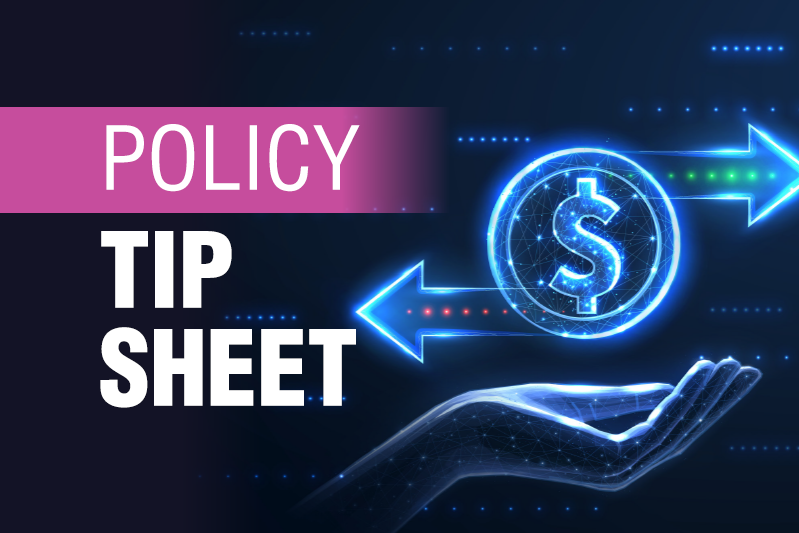Artificial intelligence (AI), automation powered by AI, advanced algorithms, and other emerging technologies are changing the landscape of the global financial services industry, including in the United States. AI offers numerous benefits to financial companies seeking to lower costs and provide speedier decisions for consumers and other businesses, but it also comes with significant threats to liberty. (For a basic primer on AI, see item 1 in the Notes section.[1])
There is a growing movement throughout the West to manipulate the design of artificial intelligence systems to advance various social and economic goals favored by progressive institutions and some governments. They can accomplish this task by ensuring that AI systems favor, disfavor, or exclude certain information, or by changing data before using it to train an AI system. In many cases, activists claim such a strategy is necessary to ensure that humans survive climate change and effectively combat alleged systemic social and economic biases, especially those related to race.[2] In reality, however, these efforts only increase bias and injustice, and they have very little, if any, effect on global warming.
This troubling development means that institutions that rely on AI and advanced algorithms, including financial services companies, run the risk of introducing the biases of designers and activists into their services. In some cases, this could put them at odds with existing regulations that mandate fair treatment of consumers and businesses.
AI in Financial Services
Over the past decade, banks and other financial institutions have rapidly adopted the use of AI. Deloitte, one of the most influential accounting firms in the United States, notes, “The emergence of AI is disrupting the physics of the industry, weakening the bonds that have held together the components of the traditional financial institutions and opening the door to more innovations and new operating models.”[3]
AI is routinely used by banks today for numerous purposes, including to chat with customers, detect fraud, and for predictive analytics.[4] Perhaps most importantly, though, is the use of AI for credit risk management and deciding which services should be advertised and/or offered to customers.[5]
Opportunities for Bias
Unbiased AI technologies built for banks can help lower costs for consumers and make customer experiences more enjoyable. But AI encoded with bias and left-wing ideological causes will be used to advance political goals, limit consumer choices, and reduce individual liberty—making them a grave threat to American families.
Unfortunately, there is substantial evidence that biased AI banking systems are already being developed, and that government and banking regulators are pressuring institutions to adopt additional changes in the immediate future.
For example, in one Harvard Business Review article published in 2020, titled “AI Can Make Bank Loans More Fair,” business data consultant Sian Townson acknowledged that she’s helped financial services companies “reverse past discrimination” by “building AI-driven systems designed to encourage less historic accuracy but greater equity.”[6]
“That means training and testing [AI systems] not merely on the loans or mortgages issued in the past,” Townson wrote further, “but instead on how the money should have been lent in a more equitable world.”[7] Put more simply, Townson says banks and other financial institutions have and should continue to rig AI banking systems to “fix” the injustices of the past.
Tremendous pressure from the federal government and central banks like the Federal Reserve is also being applied to banks to coerce them to adopt AI systems that put social justice, rather than raw data, at the center of their plans for AI development.[8]
In October 2022, the White House released a “Blueprint for an AI Bill of Rights.” The AI Bill of Rights includes a troubling section titled “Algorithmic Discrimination Protections,” which reads in part, “Algorithmic discrimination occurs when automated systems contribute to unjustified different treatment or impacts disfavoring people based on their race” and other factors.[9] In other words, if AI isn’t producing equitable outcomes, then the White House claims it’s guilty of “discrimination.”
Among other things, the Biden administration wants AI designers, including those who work for financial institutions, to use “proactive equity assessments as part of the system design,” a move that would deliberately bias AI to achieve social or economic goals favored by President Biden.[10]
In September 2023, heads of state in the powerful G20 international association issued a lengthy joint declaration that included a demand for “international governance for AI” and “responsible AI” that would be designed to address “biases.”[11] The declaration also promised member nations, including the United States, would use AI regulations in industry, including banking, to achieve the United Nations’ Sustainable Development Goals (SDGs). Not only are the SDGs notoriously biased in favor of left-wing causes, they were also the primary goals of the radical Great Reset movement launched by the World Economic Forum in 2020.[12]
Policy Recommendations
Lawmakers concerned about these important issues should first consider investigating the use of AI by financial institutions in their state, including banks and insurance companies. In some cases, institutions might already be using AI in ways that violate state or federal law.
Policymakers could also create consumer financial protections that mandate financial institutions only use unbiased AI systems when determining whether applicants are eligible for loans or other products or services. AI that’s trained or dependent on manipulated data, as well as AI that is designed specifically to favor certain social or ideological causes, could be forbidden. AI systems used in banking and insurance should be dependent exclusively or nearly exclusively on financial considerations, rather than non-financial factors such as a loan applicant’s political views or a business’s commitment to battling climate change.
At the very least, consumers should have the right to know all the specific criteria AI banking systems consider prior to applying for loans or other kinds of financial services.
It’s important to note that fair access banking and insurance rules would also address many of the concerns outlined in this Tip Sheet. Banks and insurance companies generally cannot escape regulatory burdens by turning to AI systems. They are obligated to ensure their use of AI is in line with federal and state laws. Thus, if a state requires fair access, financial institutions’ AI systems must be in compliance with fair access guidelines.
In cases where lawmakers choose to impose fair access requirements on banks and/or insurance companies, they should also consider adding to their legislation a private cause of action provision. A private cause of action provision would allow citizens to directly file lawsuits against offending institutions, making it more likely that violators would be held accountable.
[1] Justin Haskins, “AI and ESG: How Artificial Intelligence Is Being Designed to Advance Left-Wing Goals,” Legislative Tip Sheet, The Heartland Institute and Henry Dearborn Institute, October 2023.
[2] See ReNika Moore, “We Must Get Racism Out of Automated Decision-Making,” aclu.org, American Civil Liberties Union, November 18, 2021, https://www.aclu.org/news/racial-justice/we-must-get-racism-out-of-automated-decision-making
[3] “How Artificial Intelligence is Transforming the Financial Services Industry,” Deloitte, deloitte.com, last accessed September 19, 2023, https://www2.deloitte.com/za/en/nigeria/pages/risk/articles/how-artificial-intelligence-is-transforming-the-financial-services-industry.html
[4] “How Artificial Intelligence is Transforming the Financial Services Industry,” Deloitte.
[5] “How Artificial Intelligence is Transforming the Financial Services Industry,” Deloitte.
[6] Sian Townson, “AI Can Make Bank Loans More Fair,” Harvard Business Review, hbr.org, November 6, 2020, https://hbr.org/2020/11/ai-can-make-bank-loans-more-fair
[7] Sian Townson, “AI Can Make Bank Loans More Fair.”
[8] In July 2023, Federal Reserve Vice Chair for Supervision Michael Barr warned banks against training AI using historical data that has “bias” that’s “inherent in the data”—a common claim by left-wing activists about virtually all historical banking and housing data. See Paul Lim, Amber Hay, and Peter Schildkraut, “The Fed Warns About AI Bias,” Arnold & Porter, arnoldporter.com, August 21, 2023, https://www.arnoldporter.com/en/perspectives/blogs/enforcement-edge/2023/08/the-fed-warns-about-ai-bias
[9] “Algorithmic Discrimination Protections,” Blueprint for an AI Bill of Rights, WhiteHouse.gov, U.S. Office of Science and Technology Policy, last accessed August 29, 2023, https://www.whitehouse.gov/ostp/ai-bill-of-rights/algorithmic-discrimination-protections-2
[10] “Algorithmic Discrimination Protections,” Blueprint for an AI Bill of Rights, WhiteHouse.gov, U.S. Office of Science and Technology Policy.
[11] “G20 New Delhi Leaders’ Declaration,” G20.org, September 2023, https://www.g20.org/content/dam/gtwenty/gtwenty_new/document/G20-New-Delhi-Leaders-Declaration.pdf
[12] See, for example, Amanda Russo, “Leaders Rally for a ‘Great Reset’ to Achieve Global Goals,” press release, World Economic Forum, weforum.org, September 24, 2020, https://www.weforum.org/press/2020/09/leaders-rally-for-a-great-reset-to-achieve-global-goals
Justin Haskins is a New York Times bestselling author and political commentator, the president and founder of The Henry Dearborn Liberty Network, and the director of the Socialism Research Center at The Heartland Institute, a national free-market think tank. (His work here does not necessarily reflect the views of The Heartland Institute.) Follow him on Twitter @JustinTHaskins.





